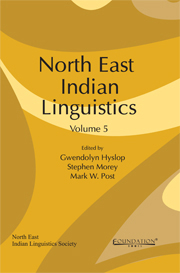Book contents
- Frontmatter
- Contents
- About the Contributors
- Foreword
- A Note from the Editors
- Contact and genetic linguistics
- Historical-comparative Tibeto-Burman grammar
- 4 Proto-Boro-Garo verbal elements
- 5 Verb agreement suffixes in Mizo-Kuki-Chin
- 6 Towards deciphering the linguistic content of an age-old Dimasa narrative
- The North East Indian noun phrase
- Assamese grammar
- Advances in Boro-Garo phonology
- Poetics and text
6 - Towards deciphering the linguistic content of an age-old Dimasa narrative
from Historical-comparative Tibeto-Burman grammar
Published online by Cambridge University Press: 05 September 2013
- Frontmatter
- Contents
- About the Contributors
- Foreword
- A Note from the Editors
- Contact and genetic linguistics
- Historical-comparative Tibeto-Burman grammar
- 4 Proto-Boro-Garo verbal elements
- 5 Verb agreement suffixes in Mizo-Kuki-Chin
- 6 Towards deciphering the linguistic content of an age-old Dimasa narrative
- The North East Indian noun phrase
- Assamese grammar
- Advances in Boro-Garo phonology
- Poetics and text
Summary
Introduction
Dimasa belongs to the Bodo-Garo group of the Tibeto-Burman language family. An age-old narrative traces the origin and migration of this linguistic sub-group including the Dimasas. N.K. Barman (2007) has documented this age-old narrative, which the Dimasas still believe is one of the oldest sources indicating their first settlement and the subsequent migration (Thaosen 2009). It narrates the migration from their homeland somewhere in Tibet (Barpujari 1997) to the confluence of the rivers Dilao or Dilaobra (Brahmaputra) and Sanggibra (Tsang-po) and further down towards the Sunderbans. The duration of migration from their homeland to the Brahmaputra River Valley was believed to have lasted 500 years and to occur possibly around 1000 BCE. Only a group of Dimasa priests from the clan Jonthai are well-versed and they divinely preserve this age-old narrative. Very few folk epic in Dimasa survive today. They give clues not just about the evolution of the Bodo-Garos but they can also help in reconstructing the proto-forms of the then language Proto-Bodo-Garo. The language of the narrative is in Dimasa although it is not easy to understand for the Dimasa speakers today. The language in the narrative may not be as old as is purported. However, it is definitely not the modern Dimasa language which is spoken today. I will, therefore, use the terms OD (Old Dimasa) for the narrative and compare it with MD (Modern Dimasa) for the present-day Dimasa language.
The age-old folk narrative in Dimasa and the full translation in English have been extracted from N.K. Barman (2007) and linguistically analysed by the author.
- Type
- Chapter
- Information
- North East Indian Linguistics , pp. 151 - 168Publisher: Foundation BooksPrint publication year: 2013



